With one death and four positive cases, Mumbai's largest slum faces not just a medical emergency, but a livelihood breakdown as every small business shutters and its enterprising residents are forced to play carrom
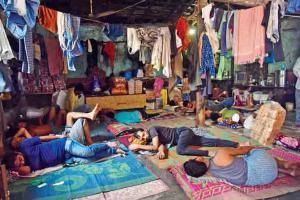
Forget the streets, even our homes are crowded, says local social worker Mariam Rashid, who has set aside her womenu00c3u00a2u00c2u0080u00c2u0099s right work to help with food relief
Mariam Rashid is terrified of stepping out of home. The 56-year-old heads the Dharavi branch of the Society for Human and Environment Development (SHED), a non-profit working for community welfare. She is concerned that she may be mobbed by harried slum dwellers desperate for supplies. On March 31, Rashid received 1,000 food grain packets from the Art of Living Foundation. But, in an area that is spread over 613 hectares and houses more than 15 lakh people, most of whom depend on daily wages, the stock was a drop in the ocean. "On the first day, things spiralled out of control because of the number of people who turned up. How do you decide who deserves it?" Rashid says. She roped in local resident volunteers to identify needy families. Rashid is a women's rights activist, but has had to put her core job on hold since the national lockdown was announced by the prime minister to contain the spread of the Coronavirus outbreak. She says, "The overriding concern for most people is not the virus, but rationing and earning for two square meals."
ADVERTISEMENT
On April 1, a 56-year-old COVID-19 patient from Dharavi, died at the Lokmanya Tilak General Hospital in Sion. The deceased, a garment workshop owner, was a resident of a Slum Redevelopment Authority (SRA) building, which was then sealed by the Brihanmumbai Municipal Corporation (BMC). This was followed by two more cases; a 54-year-old sweeper from the locality and a 35-year-old doctor who ran a clinic on the main road in Dharavi. As per health department officials, the former patient was attached to the solid waste department of the BMC. Presently, Mumbai is the worst COVID-19-affected city in India, with 330 positive cases and at least 22 deaths. Dr Mohan Joshi, dean of Sion Hospital, who was in charge of the Coronavirus isolation centre at Seven Hills Hospital, Marol, was quarantined after he developed symptoms. Acting dean Dr Pramod Ingale, says, they are only treating suspected cases at the moment. "As per the protocol, we treat the patient, send the swab for testing and if it turns out to be positive, they are sent to an isolation facility. If there's a death, we notify the medical officer health (MOH) and the police and further action of quarantine and sanitation is taken up," he says. The fever ward currently has 15 patients with symptoms. They are awaiting the results. Ingale says there hasn't been an overwhelming flurry of cases yet. "There are a couple of hospitals identified by the BMC as primary isolation facilities. If they get full, then medical colleges like ours will have to start housing COVID-19 patients. I hope it doesn't come to that."
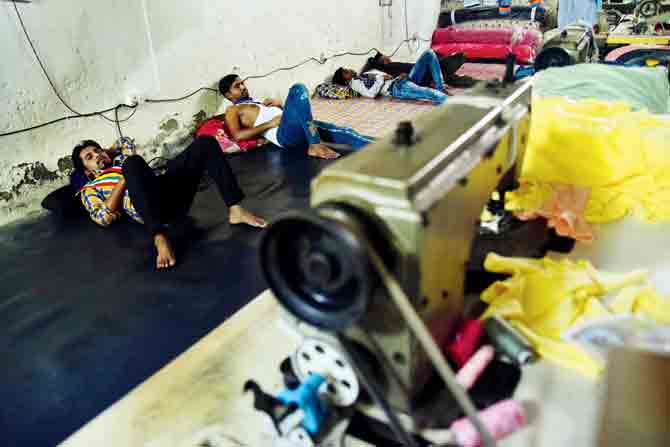
Tailoring units see migrant workers shack up where they once used to work
Dharavi has 8.69 lakh people per square mile, making it a potential hotspot for the spread of infection.The casualty has led to intense patrolling by the police to enforce strict quarantine measures. "Forget streets, even our homes are crowded," says Rashid. "There are large families with over six members living in a 10x10 feet homes, with ladders leading up to mezzanines." With people confined indoors, the streets wear a deserted look. Factories and units involved in Dharavi's major businesses of plastic recycling, textile manufacturing and food production remain locked up. The calm outside is a striking contrast to the unrest within. "With orders dried up and workshops closed, workers are twiddling their thumbs," says Govind Chitroda, 51, who runs a pottery warehouse in Kumbharwada, Dharavi's potters enclave.
Inside the workshops, artisans play carrom to while away time, or watch television. With each passing day, the frustration is building. Usually, this time of the year is a busy ones with festivals like Durga Ashtami and Ram Navami. With ceramics not falling under "essential" items, Chitroda and his artisans fear a loss of livelihood even after the lockdown is lifted. "People are mindful of their expenses. They may look for a cheaper substitute for pottery vessels," he says.
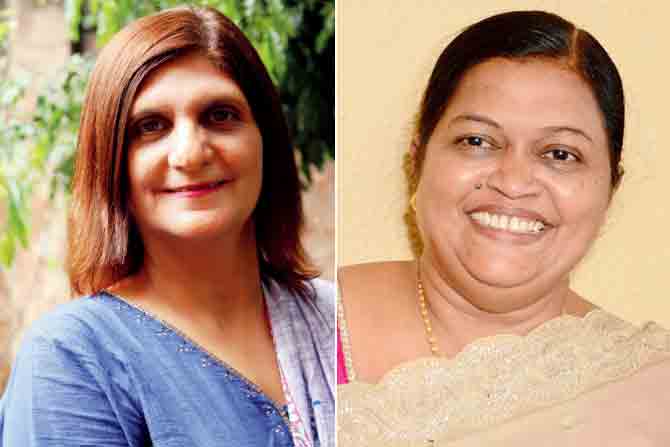
Nayreen Daruwalla, director, SNEHA and Mariam Rashid
The recycling industry has been hit because of the restrictions on transport. "No karkhana owner is going to retain employees because he won't be able to give salaries. All workers have been asked to go home," says Vinod Shetty, a human rights and labour laws advocate, who runs ACORN Foundation (India). According to Shetty, 50 tonnes of dry waste from across the city is brought to Dharavi daily, including metals, cardboard, plastic, paper, and glass. The monumental task of segregating and treating the trash is carried out by 200 recycling units housed here. While some establishments have licenses, many small set-ups are doing the job silently.

Mohammed Sadique, founder, Inside Mumbai Tours, conducted his last Dharavi tour on March 15
The potters' settlement houses over 100 families in shanties. An average family includes eight members in a 600-800 sq ft area. Chitroda says residents have been taking necessary precautions like wearing face masks and washing hands every two hours. "If I step out to buy essentials, I make it a point to bathe after I return, wash my clothes and disinfect the carry bags." According to the World Health Organisation, COVID-19 is spread through respiratory droplets, which typically travel about three to six feet and settle on surfaces, where they can live from a few hours up to several days. While there is a risk of catching the disease by inhaling these droplets, the chances of infection are higher if you end up touching surfaces where they may have settled.
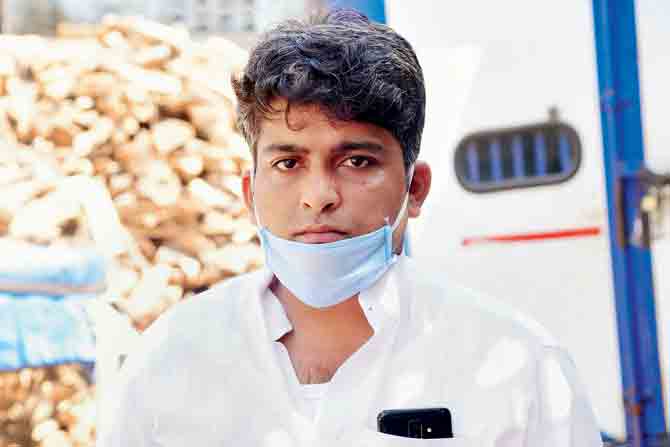
Aamir Abdul Aziz Khan, who runs school bag-making workshops, is arranging meals for 2,400 workers with help from fellow entrepreneurs
But in Dharavi, precautions are tougher to take than elsewhere. With no private bathrooms in most homes, the communal tap is their only water source. "Women wash utensils at the community tap and queue up to collect water in the mornings. How do you practice isolation?" Rashid wonders.
There are no easy answers.

At Kumbharwada, there are over 100 families living in shanties. An average family has about eight members occupying an area of 600-800 sqft
Pankaj Joshi, executive director of the Urban Development Research Institute (UDRI), believes that the WHO standard protocol for social distancing cannot be applied to a slum set-up. "It's doable for the middle class who live in apartments, but not for slums, where the density makes it an impractical proposition. We will need to formulate proactive measures of testing and isolation," he says.
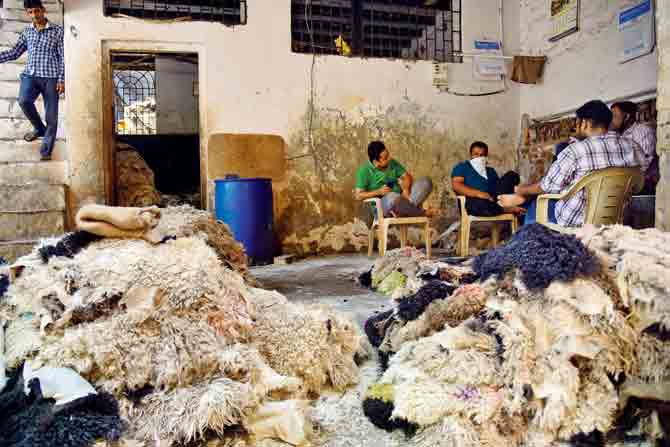
Leather unit workers sit amid mounds of unprocessed leather piled up due to the lockdown. Pics/ Shadab Khan
Presently, more than 4,000 health workers have been deployed by the BMC to trace and test all persons suspected of carrying the infection. Healthcare organisations understand the limitations and are trying to work around it. Nayreen Daruwalla, director, SNEHA (Society for Nutrition, Education and Health Action), has asked her team members to avoid engaging directly with the residents to mitigate the risk of infection. The team comprises a total of 480 members, of which 65 per cent are involved in field work. Every day, they run calls to families in the slum to raise awareness around hygiene measures, health and nutrition. One of the challenges for them is to drive home the concept of social distancing. "Since the community is gregarious and unified in what they do, it becomes difficult to talk about social distancing. A volunteer was telling me that one of the residents was unwilling to give her mobile number for the Corona-awareness session because she said she could easily get all the information from her neighbour. This is exactly what we are telling them not to do. You cannot socialise even with the person next door."
It's not just artisans and manual labourers who are facing the heat. In late February, when information about the infection began doing the rounds in WhatsApp groups, tour guide Mohammed Sadique, who runs Inside Mumbai Tours, began facing resistance from residents. The ire was over his signature Dharavi tour. "By then, people had heard reports about how it is being transmitted by those who have travelled abroad. So, they didn't want foreigners to enter the area." Sadique eventually cancelled all the bookings until May. Himanshu S of Dharavi Art Room, a non-profit organisation that empowers children and women through art, discontinued activities mid March, including the meal programme that they had introduced this month. "We now transfer the money to the parents' account. We have decided to do this until the lockdown. After that, we'll have to start fund-raising activities," says the JJ School of Art alumnus. They are currently catering to 60 kids in the area with an allowance of R100 per day. Many residents have been pooling in money to keep families afloat.

Pankaj Joshi, executive director, UDRI
Garment factory owner Aamir Abdul Aziz Khan, who runs workshops for the production of school bags and carriers, has been arranging meals for 2,400 workers with help from fellow owners. "We got small-time caterers who are currently jobless to prepare the meals. We pay them Rs 3,000 a day and supply the required raw materials," he says. As government-owned ration shops in the area continue to remain closed, Khan says it's the duty of residents, who are relatively better off to support the others.

Vinod Shetty, ACORN Foundation (India) and Rashmi Bansal, author
Rashmi Bansal is the co-author of Poor Little Rich Slum: What We Saw in Dharavi and Why It Matters, a 2012 release that discussed the spirit of entrepreneurship in Dharavi. She has been following the developments closely in a neighbourhood where she has spent countless hours researching, interacting with residents and identifying success stories. Last year, Bansal revisited the area for a UNDP project. Not much has changed over the last eight years, she observes. "The number of people who have tuberculosis and gastroenteritis is alarming. Unfortunately, they are used to a hard life." Despite the conditions, Bansal thinks Dharavi is better off than most other slums in the city. "I visited Govandi and it's far worse. Most in Dharavi have identity cards and are aware of their rights. They are better off than the others," she says. Joshi, too, is optimistic of battling the pandemic in the slum. "We were fairly successful in eradicating polio in informal settings, and conducting large-scale immunisation drives in slums. If we can replicate that zeal and scale up the testing process, it will show results. There is no one-size-fits all answer to the problem. We need to deal with it in our own way."
Catch up on all the latest Mumbai news, crime news, current affairs, and also a complete guide on Mumbai from food to things to do and events across the city here. Also download the new mid-day Android and iOS apps to get latest updates
 Subscribe today by clicking the link and stay updated with the latest news!" Click here!
Subscribe today by clicking the link and stay updated with the latest news!" Click here!






